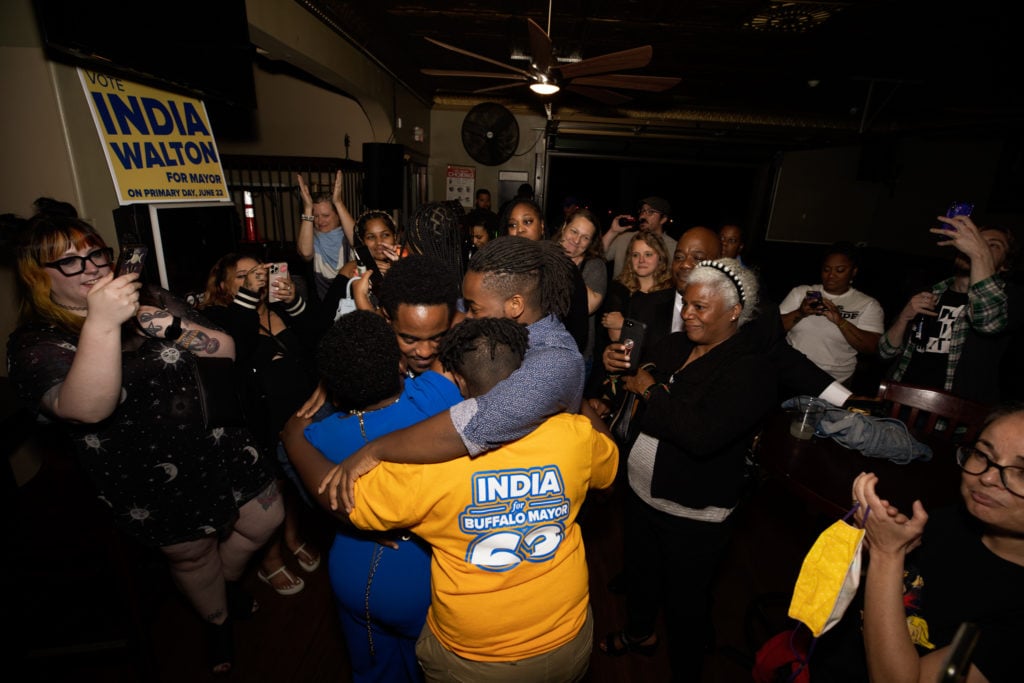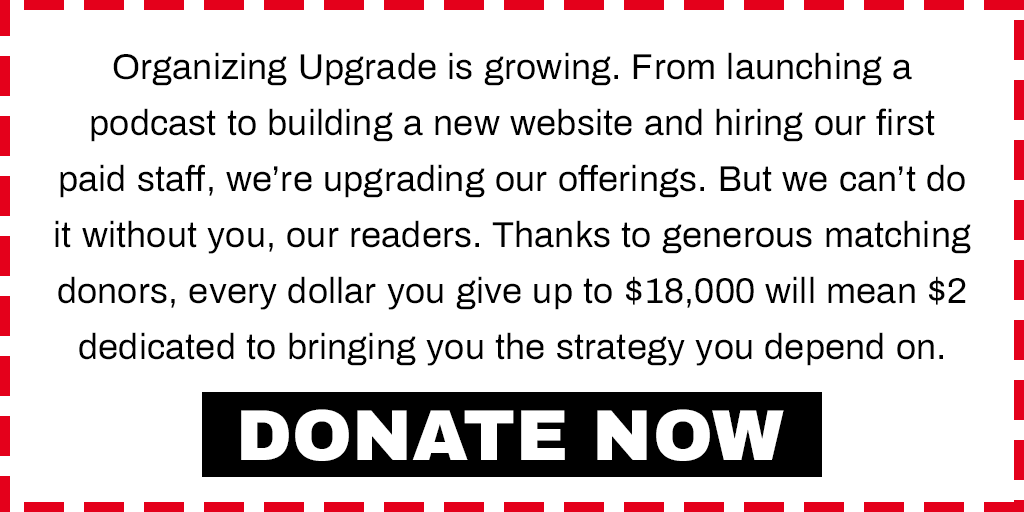“When we organize, WE WIN!”
That refrain echoed in the hearts of community organizers, activists, labor leaders, and India Walton’s campaign supporters in Buffalo on primary night – and the candidate herself proclaimed it in her victory speech, explaining how an insurgent could take on a deeply entrenched political establishment and prevail. Her now-iconic opening line from that same speech distilled her other basic how-to – a firm belief in herself and the people-powered campaign she ran: “I hate to tell you I told you so…”.
Buffalo made international headlines on June 22 when Walton, an unabashed socialist, beat four-term incumbent Byron Brown in the city’s Democratic mayoral primary. If she can stave off Brown’s write-in campaign, she will be the first woman mayor of Buffalo in its 189-year history and the first socialist mayor of a major American city in 60 years. From the outside looking in, it was entirely unexpected. For many in the city, it was decades in the making and the most hopeful local political event in a generation. But before we get to that, let’s rewind.
From powerhouse to poverty
Geographic advantages made Buffalo an economic powerhouse for much of the nineteenth and early twentieth centuries. It was home to the terminus of the Erie Canal, and later to grain and steel mills; it was situated close to Niagara Falls, which produced electricity that powered the city. At the onset of the Great Depression, Buffalo was the thirteenth largest city in the United States. In the 90 years since then, the city’s population has significantly declined and its industrial history has become just that: history. Like other Rust Belt cities, Buffalo has been forced into an extractive and exploitative relationship with capital.
Under the Brown administration, that relationship has only been further exacerbated. That’s how Buffalo remains the third poorest and sixth most segregated city in the country year after year. India Walton intentionally highlighted those statistics in her stump speech with a compelling narrative that made city residents ask themselves who was really benefiting from the “renaissance,” a term that has become synonymous with Buffalo’s so-called comeback, funded by New York State Governor Andrew Cuomo and overseen on the ground by Mayor Brown over the past decade. The two corporate Democrats, Cuomo and Brown, have been in a codependent relationship with one another through it all. The corruption-plagued “Buffalo Billion” is their most notable accomplishment – or blunder, depending on who you talk to.
Announced at Governor Cuomo’s 2012 “State of the State” address, the intended goal was the investment of $1 billion in the Buffalo economy through a combination of state grants and tax breaks to spur economic development. What it actually amounted to was a program of giveaways for the rich. The poster child was the SolarCity project in South Buffalo, where New York State spent $750 million to build and outfit a solar panel factory that was taken over by Tesla in 2016. It hasn’t gone well. Besides busting a union drive and breeding a culture of racism and sexism, the plant still falls 500 jobs short of its local hiring requirements.
The Tesla plant typifies Byron Brown’s economic development policies as well. He has created a political environment in which real estate developers and corporate interests have an outsized role in the city’s decision-making process and priorities. Public dollars continue to be diverted from social services to the private sector.
“Deep poverty issues. Deep segregation, both politically and geographically. An economy that seems to revolve largely around this shell game of development dollars. We don’t create a lot of new assets. We don’t generate a lot of new wealth,” said Geoff Kelly, a journalist with Investigative Post who has been writing about Buffalo local government and politics for decades. “We live on subsidies from the federal government, and this is the economic and political system that Byron Brown slotted into after he graduated from Buffalo State and became a staffer to various politicians and then later, when he became an elected official himself.”
People challenge politics as usual
It’s that same economic and political system that the Left has been holding a referendum on throughout the country over the past several years. By calling out that system, and offering alternative visions, the Left is garnering support for and building people’s movements.
Everyday people are running for political office en masse, with stories and lived experiences that deeply resonate with the constituents that they are looking to represent. The candidates-turned-elected-officials who have come before India Walton include U.S. Representatives Alexandria Ocasio-Cortez, Ilhan Omar, and Cori Bush (who Walton evoked throughout her campaign, Congressional hopeful Nina Turner, and New York City Public Advocate Jumaane Williams. Most of them, along with Senator Bernie Sanders, have already endorsed India Walton’s campaign.
“A big part of what laid the groundwork for a successful pushback against the Democratic political establishment is the lived experiences of neoliberal politics on all of us in Buffalo,” said Our City Action Buffalo member Rachel Fix Dominguez.
Founded in 2020, Our City Action Buffalo is a coalition of Buffalo residents who have knowledge and expertise in specific policy areas, as well as a broad framework for working towards social change. The coalition created a policy platform that involved the input of hundreds of Buffalonians on seven key issue areas – housing, policing, education, immigration, frontline arts, transportation, and climate – which was integrated into the Walton campaign’s own policy platform.
“We recognized early on that one important path to change in the city was through electoral politics, and having elected officials who represented our own experiences, worldview, and our vision for what is possible,” Fix Dominguez said.
Enter India Walton. A community organizer, nurse, and mother.
‘Real. Resilient. Ready.’
Walton announced her candidacy for mayor of Buffalo through a computer screen on Zoom to over 100 city residents on a blustery day in December 2020. Her self-selected campaign motto, “Real. Resilient. Ready.” was a preemptive rebuttal to those who would question her aptitude. She made it clear that she was running to win, and to make an opportunity to institute substantive and transformative change.
Born on Buffalo’s East Side, Walton spoke with authority about the neglect experienced by long-time residents because of the policy decisions of elected officials throughout her life. It was the same when she spoke about police violence and brutality. While the mayor was nowhere to be found, Walton spoke convincingly about the need to redefine safety and invest in communities, as a leader during the Buffalo Uprising in the immediate aftermath of George Floyd’s murder. Similarly, in the middle of a global pandemic when people were calling for cancellation of rent and the decommodification of housing, Walton’s fight for permanently affordable housing in the Fruit Belt as the founding Executive Director of the Fruit Belt Community Land Trust struck a chord with middle-class and more affluent progressives and poor and working-class communities alike.
The mayor never made those or any other arguments for himself, or even against his opponent. He didn’t earn any meaningful endorsements, since he really didn’t seek them. He turned a two-day news cycle into a three-week one when he refused to respond to a debate request from the Walton campaign. It made front page news, and was the talk of the town. This perceived disrespect of the democratic process angered voters, and was reported as the moment that many who had supported Brown in the past decided to cast their vote for Walton instead.
“The mayor seemed confident that he could glide to reelection without engaging. He could ignore her and then other voters would, too. Turns out: You have to campaign or the voters you’ve depended on in the past won’t come out,” said Kelly. “Not only did they not come out – a lot of them came out for India Walton. It’s what had to happen for her to win and it’s exactly what happened.”
Walton’s attitude and approach was the exact opposite of Byron Brown’s. She showed up, where she was welcomed and where she wasn’t. She talked to anyone who would listen. She took every opportunity to engage with voters and nonvoters. She sought endorsements from labor unions (that she knew she wouldn’t receive), the Democratic Party (which is now supporting her as their candidate), local, state, and national political groups and organizations, as well as public figures (such as former New York gubernatorial candidate Cynthia Nixon).
Her first endorsements were important ones, such as the (Buffalo) Democratic Socialists of America and People’s Action, whose members were part of her field operation from the very beginning. But the very real power dynamic between the two candidates began to shift when the Working Families Party endorsed Walton. That translated to more endorsements, including the Buffalo Teachers Federation, and votes at the ballot box.
Looking towards co-governance
This moment is unlike any other in Buffalo’s history, and yet in the course of the past month, our city’s radical past and imagination has been reclaimed. The same can be said in recent history with the resurgence of movement politics. It has provided a meaningful container and much-needed context with which folks like India Walton can run people-powered and people-centered campaigns, while still being accountable to the movements that elected them through co-governance.
Co-governance means that once elected, Walton will continue to listen to and actively work with the residents of Buffalo who elected her – rather than the 1% and corporate interests – to draft policies and move them forward together. Co-governance is about finding new and innovative ways to ensure that people most harmed by structural racism and our profit-driven economy are centered in the creation and implementation of the solutions.
“This is an opportunity for us to get out there and shift the culture,” said Kathryn Franco, one of a handful of progressive candidates to take on the political establishment in recent years with her run for Buffalo City Council. “It was awe-inspiring to see a campaign absolutely run by people-power and led by us, and when I say us, I mean the residents of the city of Buffalo, and at the forefront a Black woman.”
Don’t expect the political establishment and power elite to give up easily, though. After Walton’s historic primary win, Byron Brown announced his write-in campaign for mayor. He pointed to the successful write-in campaigns of Senator Lisa Murkowski in Alaska and Detroit Mayor Mike Duggan. He’s running the campaign he should’ve run during the primary, only far more dangerously. Judging from what has transpired over the past five weeks, Walton and her campaign will have to endure a grizzly four months, full of reactionary politics, poor-shaming, and unfettered misogynoir. Even so, Walton’s base remains hopeful.
“When I think about the future, I can’t wait,” Franco said. “It’s filled with all sorts of people: Women, queer folks, people who are living their lives and are now standing up and saying, ‘She can, I can, too.’”


